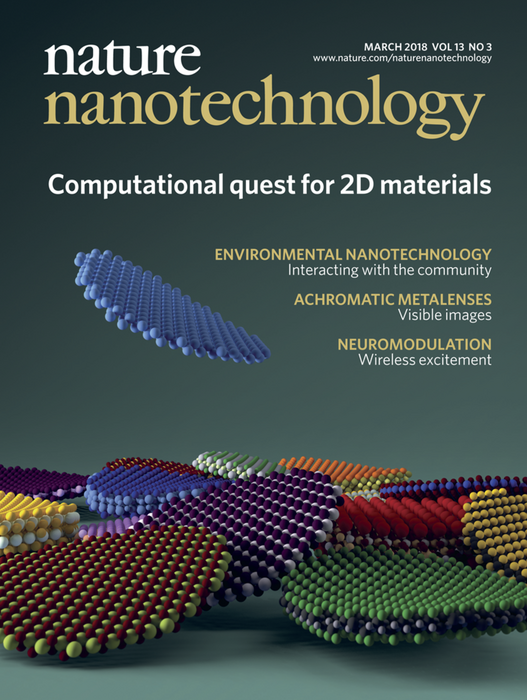Investigations into a fascinating class of novel materials that could underpin next-generation electronic and optoelectronic applications and quantum computing has won a team led by Nicola Marzari the inaugural PRACE (Partnership for Advanced Computing in Europe) HPC Excellence Award. It was established to honor “the most distinguished projects and researchers in the field of high-performance computing.”

Credit: Nature Nanotechnology
Investigations into a fascinating class of novel materials that could underpin next-generation electronic and optoelectronic applications and quantum computing has won a team led by Nicola Marzari the inaugural PRACE (Partnership for Advanced Computing in Europe) HPC Excellence Award. It was established to honor “the most distinguished projects and researchers in the field of high-performance computing.”
The award-winning research was originally described in the 2018 Nature Nanotechnology article “Two-dimensional materials from high-throughput computational exfoliation of experimentally known compounds,” whose goal was to accelerate materials discovery: while Nobel-prize winning work producing and characterizing graphene had moved 2D materials from theory to reality some 15 years prior, progress in identifying novel 2D materials was slow — only a few had been identified experimentally.
While it was clear that a computational approach could help tackle the challenge of identifying which of the hundreds of thousands of known compounds could actually be exfoliated or be stable as 2D monolayers, fundamental issues remained. How could they establish whether or not a crystal structure could be exfoliated? How should they treat and eventually perform simulations over an extensive set of candidate materials? How could they streamline predictions so that they would more reliably and automatically go from structure to property?
Marzari and his team answered all these questions with a data and computing intensive approach, managing to narrow a down a field of 108,423 unique, experimentally known inorganic compounds to just under 2000 that could be exfoliated into novel 2D materials. They then investigated the vibrational, electronic, magnetic and topological properties of a subset of the most interesting 258 compounds, identifying novel magnetic materials, half-metals, and half-semiconductors. The richness of this portfolio was then explored in more than a dozen additional studies, screening for optimal performance in different applications, from electronic transport, to superconductivity, to band topology. This led to the discovery of the first ever Kane-Mele topological insulator, to the material with largest superconducting temperature in 2D, and the most performant spin-FET transistor.
None of this would have been possible without a novel approach to computing and data. The original high-throughput study required the team to perform half a million calculations on thousands of different materials, often combining multiple codes to target complex properties. Doing this by hand not only would have required an enormous effort and considerable human power, but would have made it prone to errors and not reproducible.
This challenge drove the team to approach HPC in a radically new way, figuring out how to deal with these calculations automatically, robustly, and reliably, while preserving a fully reproducible record of the entire calculation protocols and workflows. The development of the core informatics platform of MARVEL was key: AiiDA (https://www.aiida.net) as the infrastructure to automate, manage, persist, share and reproduce all the complex workflows and data, and the Materials Cloud (https://www.materialscloud.org/discover/mc2d) to disseminate those to the community at large. AiiDA is able to handle simultaneously thousands of calculations, automating the submission and control process as well as the retrieval and storage of the results, and one can then expose the entire workflow and the raw and curated data on the Materials Cloud.
Notably, the team that will share the award — all of whom were at EPFL when the work was done — has now moved on to independent positions worldwide: Nicolas Mounet, research scientist at CERN; Marco Gibertini, assistant professor at University of Modena and Reggio Emilia; Philippe Schwaller, assistant professor at EPFL, Davide Campi, assistant professor at University of Milano-Bicocca; Andrius Merkys, researcher at Vilnius University; Antimo Marrazzo, junior assistant professor at University of Trieste; Thibault Sohier, researcher at CNRS, Laboratoire Charles Coulomb; Ivano E. Castelli, associate professor at Technical University of Denmark; Andrea Cepellotti, research scientist at Harvard University; Giovanni Pizzi, senior scientist at EPFL and group leader at PSI, and Nicola Marzari at EPFL. And of course they are all very grateful to the Swiss National Supercomputing Centre and to PRACE for providing the support and computing resources that underpinned all the research.
The prize will be presented at PASC22, held from the 27 to the 29 of June 2022 in Basel, Switzerland.
DOI
10.1038/s41565-017-0035-5




